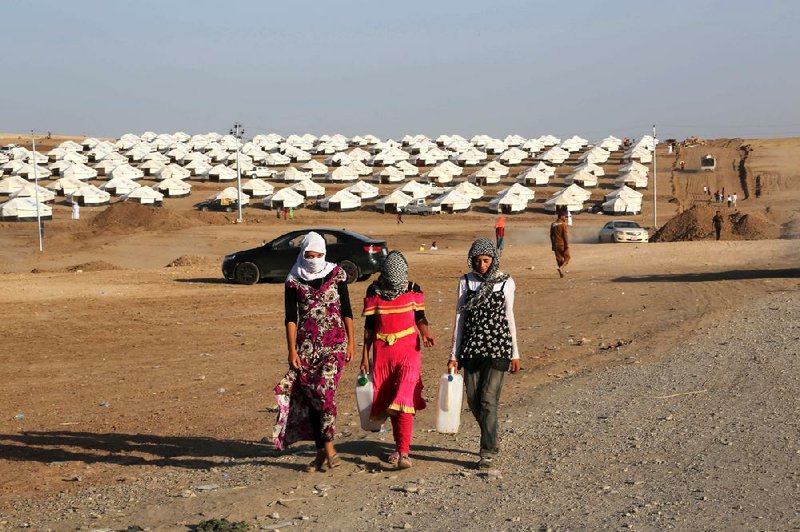BRUSSELS -- The European Union on Friday forged a unified response to the rapid advance of Islamic militants in Iraq and the resulting refugee crisis, allowing direct arms deliveries to Kurdish fighters battling the Sunni insurgents. Several EU nations pledged more humanitarian aid.
EU ministers pledged to step up efforts to help those fleeing advancing militants from the Islamic State extremist group, with several nations announcing they will fly several tons of aid supplies to northern Iraq in the coming days.
"First of all, we need to make sure that we alleviate humanitarian suffering," Dutch Foreign Minister Frans Timmermans said. "Secondly, I believe we need to make sure that [the Islamic State] is not in a position to overrun the Kurds or to take a stronger hold on Iraq."
France has pledged to ship weapons to the Kurds, and the United Kingdom is delivering ammunition and military supplies obtained from eastern European nations and is considering sending more weaponry.
Germany, the Netherlands and others said they also would consider requests to arm the Kurds.
Europe's initiative came as Iraq's Prime Minister Nouri al-Maliki agreed to step down after weeks of insisting on a third four-year term. It is hoped that his departure will pave the way for a more inclusive Iraqi government and strengthen Baghdad's position in battling the Sunni insurgency, which also has taken over parts of neighboring Syria.
A veteran Shiite lawmaker, Haider al-Abadi, now faces the challenge of forming a government in Iraq and engaging Sunni politicians, who say their disenfranchisement under al-Maliki's Shiite-dominated government fueled support for the insurgency among the Sunni minority group.
The Kurds, meanwhile, had been locked in a dispute with Baghdad over oil revenue from their largely autonomous region in the north, which prompted Baghdad to slash the annual budget to the region earlier this year, stoking calls by the ethnic minority for independence.
The EU foreign ministers called on al-Abadi to form a government that will be "inclusive and able to address the needs and legitimate aspirations of all the Iraqi citizens."
Al-Abadi said Friday that his government will be based on "efficiency and integrity, to salvage the country from security, political and economic problems."
U.S. and EU officials have said they can beef up their support for Iraq once a stable government is in place.
"It is not simply Iraq or Syria that find themselves threatened; it is the world," French President Francois Hollande said in a speech marking the 70th anniversary of the Allied invasion of Provence in southern France. "France decided to come to their aid, both humanitarian and military. And today another initiative emerged: Europe decided at last to do the same, because it is our duty. ... It is there that the future of our continent is being decided."
Officials have said about 1,700 radical Muslims from France, the U.K. and Germany are believed to have joined the fighting, and there are fears those militants could take their radicalism home. A radical French Islamist who had fought in Syria is suspected in the killing of four people at Brussels' Jewish Museum in May.
The Islamic State swiftly advanced across northern and western Iraq in June, routing the Iraqi military and taking the country's second-largest city, Mosul. Thousands of people have been killed and more than 1.5 million have been displaced.
The plight this month of thousands of Yazidis, members of a religious minority group who fled from the advancing militants and were trapped on a mountain in the Sinjar area, was key to pushing Europe toward taking action. France, the U.K., Italy and Germany have stepped up humanitarian aid to the refugees in Iraq, with air drops including food, drinking water and medical supplies.
President Barack Obama said Thursday that U.S. airstrikes and aid drops had eased the humanitarian crisis on the mountain.
But German Foreign Minister Frank-Walter Steinmeier said Kurdistan, which took in tens of thousands of refugees over the past weeks, will not only need short-term humanitarian aid but also long-term support to accommodate the displaced.
"This will very quickly challenge and probably overwhelm the infrastructure in Irbil and the region," he added.
In a joint statement, the EU foreign ministers also endorsed the decision by some member nations "to respond positively to the call by the Kurdish regional authorities to provide urgently needed military material" as long as it is done in concert with Iraq's central government.
Some had cautioned before the meeting that arming the Kurds could eventually strengthen their bid for independence from Iraq -- and those European-provided weapons eventually could be used against Baghdad's own soldiers.
Steinmeier said it was still unclear what arms the Kurds would request or get, but acknowledged there was "no decision without risk in that regard."
Information for this article was contributed by Danica Kirka, Edith M. Lederer, Geir Moulson, Sameer N. Yacoub, Vivian Salama and Qassim Abdul-Zahra of The Associated Press.
A Section on 08/16/2014


